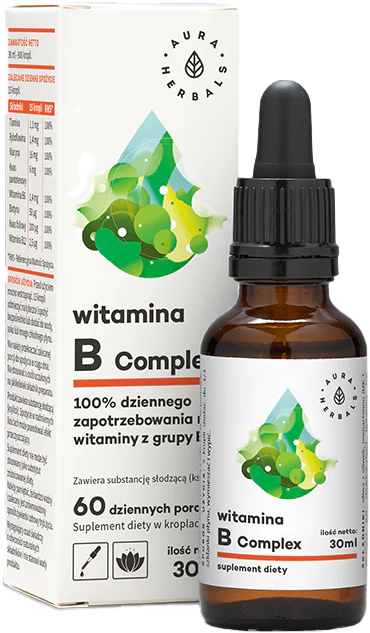Vitamin B6 - what it is, properties, dosage, supplementation
Vitamin B6 - pyridoxine highlights. Characteristics, properties, deficiency and supplementation.


Learn more about our editorial process
.

Learn more about our editorial process
.

Learn more about our editorial process
.

Learn more about our editorial process
.
Why you can trust us
Articles on Natu.Care are written based on scientific research, data from government websites and other reliable sources. The texts are written in cooperation with doctors, nutritionists and other health and beauty experts. Articles are reviewed before publication and during significant updates.
.Learn more about our editorial process
.Information about advertisements
Content on Natu.Care may contain links to products from the sale of which we may receive a commission. When creating content, we adhere to high editorial standards and take care to be objective about the products discussed. The presence of affiliate links is not dictated by our partners, and we select the products we review ourselves completely independently.
.Learn more about our terms and Conditions
.Vitamin B6 called pyridoxine affects many processes in the body. Experts repeat like a mantra that its correct levels are important.
What is vitamin B6 really? How does it affect our body? In which products does it occur? The answers to these questions are just a drop in the ocean of what you will find in this article!
Description of contents:
- What is vitamin B6? .
- Where is vitamin B6 found?
- Properties of vitamin B6 .
- In which products is vitamin B6 found?
- Vitamin B6 deficiency .
- Vitamin B6 excess .
- Requirement for vitamin B6
- Requirement for vitamin B6 .
- Supplementation of vitamin B6 .
- Vitamin B6 and pregnant women .
- Interactions of vitamin B6 with medications .
- Summary .

Sprawdź, co połączenie magnezu i witaminy B6 może zrobić dla Twojego zdrowia!
Natu.Care Magnez Premium + Witamina B6
Wesprzyj prawidłowe funkcjonowanie układu nerwowego, krwionośnego i mięśniowego dzięki synergicznemu działaniu magnezu i witaminy B6. Odkryj pełnię korzyści dla Twojego zdrowia każdego dnia!
Sprawdź cenę
Magnez Premium przyjmuję już od 2 miesięcy i naprawdę czuję się znacznie lepiej. Mam więcej energii, przestałam mieć skurcze i nie denerwuję się już tak szybko, co w przypadku bycia mamą – bywa wyzwaniem!@DianaW.
See also:
- B vitamins [properties + where they occur] .
- Vitamin B1 (thiamine) [properties + where it occurs] .
- Vitamin B2 [properties + where it occurs] .
- Vitamin B3 [properties + where it occurs]
- Niacin [what it is + effects and side effects] .
- Vitamin B5 (pantothenic acid) [what it is + properties and excess] .
- Biotin [what it is + properties and side effects] .
- Biotin for hair [what it gives and effects + ranking]
- Vitamin B9 (folic acid) [what it is + properties and excess] .
- Vitamin B12 [what it helps with + where it occurs] .
- Vitamin C [properties + dosage] .
- Magnesium [what it is in + properties] .
- Best magnesium [ranking + pharmacist's opinion] .
What is vitamin B6?
.
Vitamin B6 called pyridoxine is a water-soluble vitamin. It affects brain development and the health of the immune and nervous systems. It affects the metabolism of proteins, fats and carbohydrates. Our body does not produce vitamin B6. It is necessary to take it with food or supplementationand.
Would you like to learn more about omega acids? I invite you to read an article about omega-3.
Where is vitamin B6 in the body?
.
Vitamin B6 is absorbed in the jejunum, one of the three parts of the small intestine. The body only keeps a small amount of pyridoxine in the body. Vitamin B6 is water-soluble, so our body cannot store it. Its residues are removed each day with urineand.
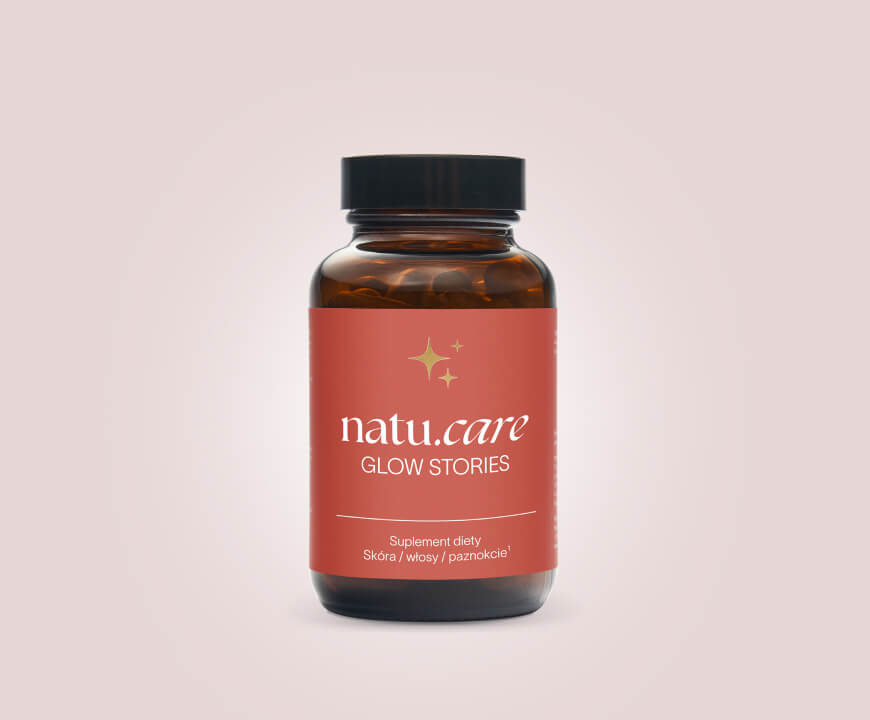
Glow Stories - for healthy skin, hair and nails
.Product with high-quality folic acid Quatrefolic®, bamboo shoot extract and ingredients that have a positive effect on skin, hair and nails.
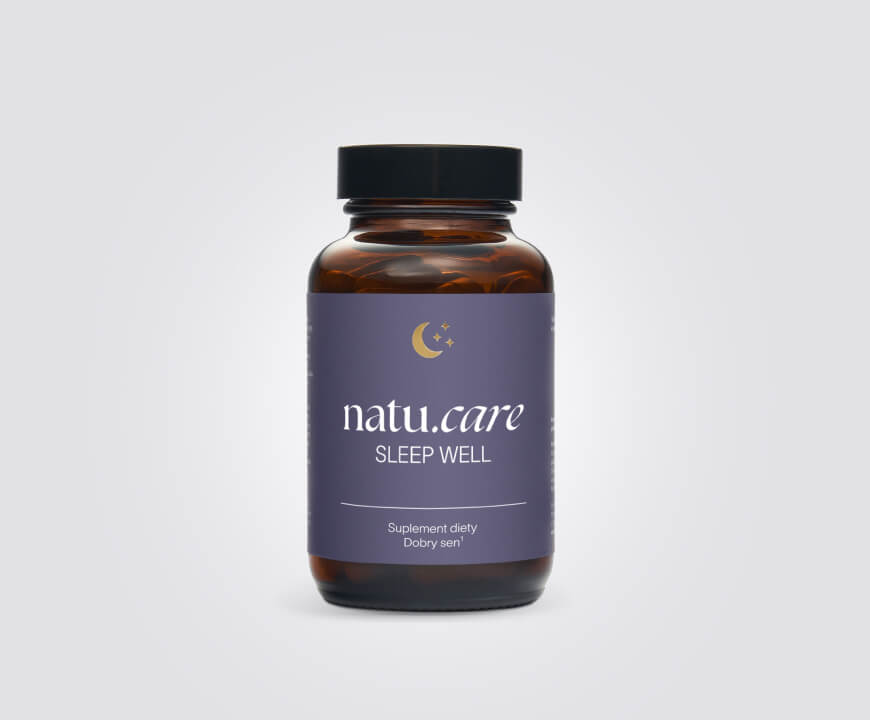
Sleep Well - dietary supplement for good sleep and tranquillity
.Sleep Well is a calming and relaxing dietary supplement with a standardised complex of CALMOMIX® herbal extracts and high-quality magnesium.
.
Properties of vitamin B6
.
Vitamin B6 is responsible for many processes. It converts into essential coenzymes for over 100 enzymes in the human bodyand. How does vitamin B6 work?
Effects on cardiovascular disease
.
Homocysteine is one of the 21 amino acids that are formed in our body through metabolism. Its high levels increase the risk of cardiovascular diseaseand.
Research has shown that taking vitamin B6 lowers homocysteine levelsand. However, pyridoxine has not been proven to prevent heart disease, so supplementation is not recommended for this purpose.
Right homocysteine levels reduce the risk of atherosclerosis, for example..
 .
.
.
Diabetes prevention
.
Vitamin B6 is a cofactor for about 150 reactions that regulate the metabolism of glucose, lipids, amino acids, DNA and neurotransmitters. Studies have shown that its normal levels in the body prevent diabetes. Moreover, it has a pronounced protective effect against diabetic complicationsand.
Vitamin B6 influences the proper metabolism of carbohydrates and fats. This ensures that energy is supplied to the body. Vitamin B6 is also involved in the metabolism of amino acids, which ensures normal growth and development of the body..
 .
.
Effects on the nervous system
.
As reported by MA Pharmacy, vitamin B6 is essential for the proper functioning of the nervous system. It is involved in the production of neurotransmitters, thanks to which the nervous system works properlyand.
Prevention of anaemia
.
Mr Luke states that vitamin B6 is responsible for one of the first stages of haemoglobin production. Haemoglobin deficiency is one of the factors responsible for anaemia. Therefore, we can admit that vitamin B6 prevents anaemia.
Soothing nausea
.
Vitamin B6 has long been recognised as an inhibitor of pregnancy nausea. A study involving 77 women showed that 40 mg of vitamin B6 taken twice a day - reduced themand. Over-the-counter vitamin B6 is recommended by specialists as a first aid for nausea.
How else does vitamin B6 workand?
- .
- Strengthens the immune system. .
- Improves mood by stimulating the body's production of serotonin.
- Alleviates menstrual pain. .
- Protects against the harmful effects of air pollution. .
- It is helpful in the treatment of anaemia.
- Prevents macular degeneration. .
- Promotes the treatment of rheumatoid arthritis. .
Vitamin B6 influences normal muscle function, including heart function..
 .
.
.
Dr Jacob's Melatonin + B12
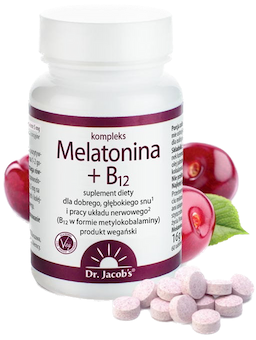
- Active ingredients: melatonin, vitamin B12
- Form: sucking pastilles .
- Dosage: 1 lozenge per day .
- Sufficient for: 60 days .
Product description
Sweet pleasures in the evening are rather forbidden. Well, unless it's cherry lozenges with melatonin and vitamin B12, whichóre going to improve the quality of your sleep.
One tablet in the evening will shorten your sleep time and stop you waking up.
One tablet in the evening will shortenóyour time to fall asleep and stop you waking up during the night. The addition of vitamin B12 will improve the functioning of the nervous system, making you even better rested.
The following tablets will help to improve the quality of your sleep.
Pros and cons
Sweet pleasures in the evening are rather forbidden. Well, unless it's cherry lozenges with melatonin and vitamin B12, whichóre going to improve the quality of your sleep.
One tablet in the evening will shorten your sleep time and stop you waking up.
One tablet in the evening will shortenóyour time to fall asleep and stop you waking up during the night. The addition of vitamin B12 will improve the functioning of the nervous system, making you even better rested.
The following tablets will help to improve the quality of your sleep.
Additional information
Sweet pleasures in the evening are rather forbidden. Well, unless it's cherry lozenges with melatonin and vitamin B12, whichóre going to improve the quality of your sleep.
One tablet in the evening will shorten your sleep time and stop you waking up.
One tablet in the evening will shortenóyour time to fall asleep and stop you waking up during the night. The addition of vitamin B12 will improve the functioning of the nervous system, making you even better rested.
The following tablets will help to improve the quality of your sleep.
User review
Sweet pleasures in the evening are rather forbidden. Well, unless it's cherry lozenges with melatonin and vitamin B12, whichóre going to improve the quality of your sleep.
One tablet in the evening will shorten your sleep time and stop you waking up.
One tablet in the evening will shortenóyour time to fall asleep and stop you waking up during the night. The addition of vitamin B12 will improve the functioning of the nervous system, making you even better rested.
The following tablets will help to improve the quality of your sleep.
SOLGAR natural vitamin B12
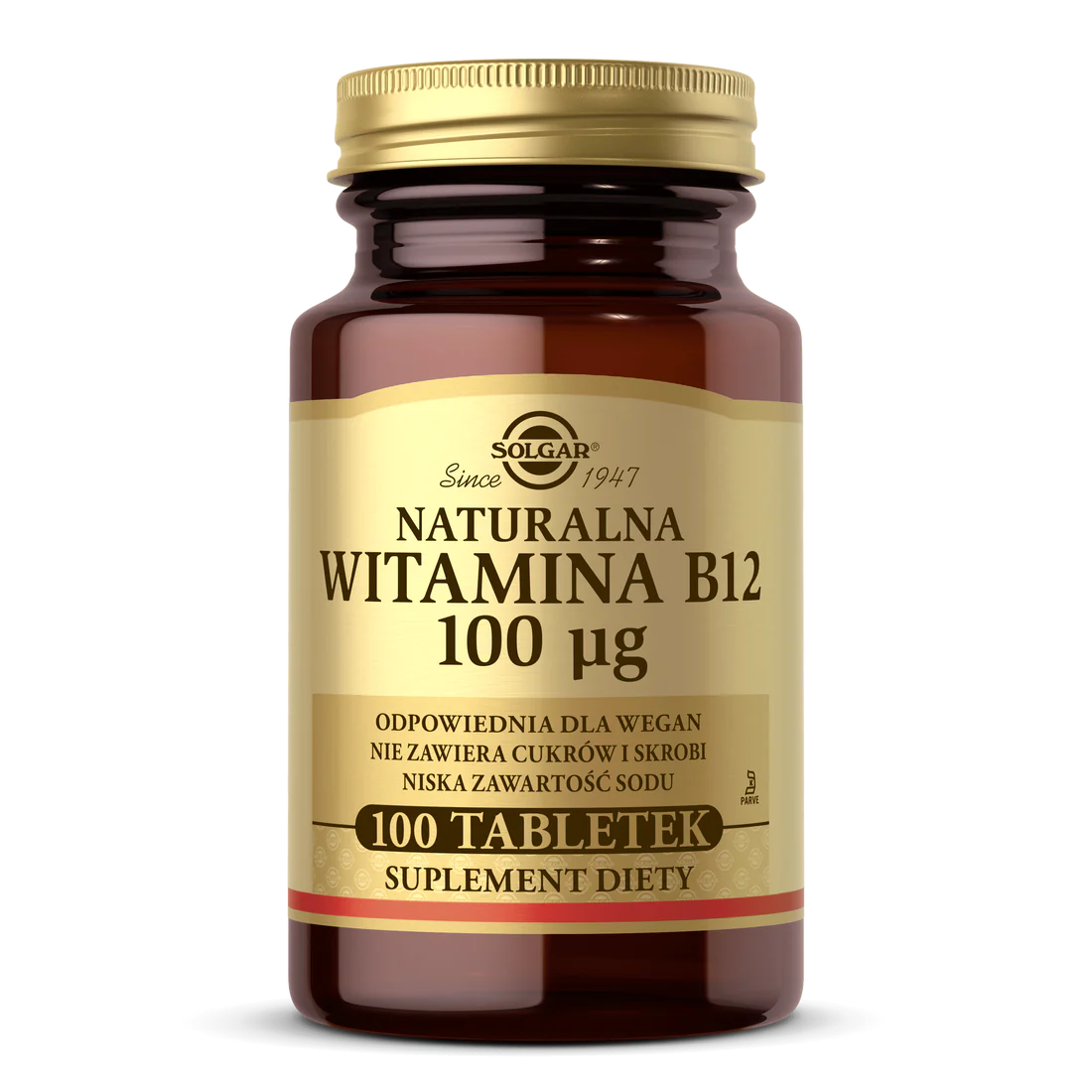
- Active ingredients: vitamin B12
- Form: tablets .
- Packaging: 100 tablets .
- Dose: 1 tablet daily .
- Sufficient for: 100 days .
Product description
The dietary supplement is a source of valuable vitamin B12 in a form that is easily absorbed by humans - cyanocobalamin. This biologically active form of vitamin B12 has many very important protective functions for the body.
Vitamin B12 supports the functioning of the immune system. It also contributes to reducing feelings of fatigue and tiredness. Its important function is also to take part in the metabolism of homocysteine, an amino acid thatós naturally formed in the human body.
Vitamin B12 is a very important protective function.
Pros and cons
The dietary supplement is a source of valuable vitamin B12 in a form that is easily absorbed by humans - cyanocobalamin. This biologically active form of vitamin B12 has many very important protective functions for the body.
Vitamin B12 supports the functioning of the immune system. It also contributes to reducing feelings of fatigue and tiredness. Its important function is also to take part in the metabolism of homocysteine, an amino acid thatós naturally formed in the human body.
Vitamin B12 is a very important protective function.
Additional information
The dietary supplement is a source of valuable vitamin B12 in a form that is easily absorbed by humans - cyanocobalamin. This biologically active form of vitamin B12 has many very important protective functions for the body.
Vitamin B12 supports the functioning of the immune system. It also contributes to reducing feelings of fatigue and tiredness. Its important function is also to take part in the metabolism of homocysteine, an amino acid thatós naturally formed in the human body.
Vitamin B12 is a very important protective function.
User review
The dietary supplement is a source of valuable vitamin B12 in a form that is easily absorbed by humans - cyanocobalamin. This biologically active form of vitamin B12 has many very important protective functions for the body.
Vitamin B12 supports the functioning of the immune system. It also contributes to reducing feelings of fatigue and tiredness. Its important function is also to take part in the metabolism of homocysteine, an amino acid thatós naturally formed in the human body.
Vitamin B12 is a very important protective function.
Aura Herbals Vitamin B Complex drops
Product description
Vegan drops with a complex of B vitamins. A daily serving covers 100% of the requirement for these vitamins. B vitamins are important for the proper functioning of the body, especially for the nervous system, metabolism and energy production.
Pros and cons
Vegan drops with a complex of B vitamins. A daily serving covers 100% of the requirement for these vitamins. B vitamins are important for the proper functioning of the body, especially for the nervous system, metabolism and energy production.
Additional information
Vegan drops with a complex of B vitamins. A daily serving covers 100% of the requirement for these vitamins. B vitamins are important for the proper functioning of the body, especially for the nervous system, metabolism and energy production.
Where vitamin B6 occurs - sources in the diet
.
Vitamin B6 is found in foods such as buckwheat groats, chicken, turkey, bran, wheat germ, as well as vegetables - broccoli and potatoes. You can also find it in whole grain cereal products, wheat germ, yeast, soya, bananas, dairy, fish (salmon) and eggs.
In which products is vitamin B6 found?
.
- Chickpeas, .
- hair, .
- chicken, .
- beef liver, .
- pork, .
- potatoes, .
- bananas, .
- oatmeal, .
- kale, .
- nuts, .
Content of vitamin B6 in foods - table
. . .
|
Product . |
Vitamin B6 content per 100 gramsand |
Fulfillment of an adult's daily requirement for vitamin B6 . |
|
Pasilla peppers (dried) . |
4.24 mg |
249% |
|
Ancho peppers (dried) |
3.54 mg |
208% |
|
Sunflower seeds |
1,354 mg |
79% |
|
Whey protein isolate |
1,163 mg . |
68% |
|
Pistachios |
1.09 mg |
64% |
|
Yellowfin tuna (cooked) . |
1.04 mg |
61% |
|
Beef liver (fried) . |
1.02 mg |
60% |
|
Skipjack tuna (cooked) . |
0.981 mg . |
58% |
|
Shiitake mushrooms (dried) . |
0.965 mg |
57% |
|
Wild Atlantic salmon (cooked) . |
0.944 mg |
56% |
Note!
.Cooking, frying, freezing and curing foods leads to loss 30 to 50 percent of vitamin B6and.
.
Vitamin B6 deficiency
.
Most of us take vitamin B6 with our daily diet. Therefore, its deficiency is rare. Insufficient levels of pyridoxine are most often linked to an inadequate diet or excessive alcohol consumption. Vitamin B6 deficiency leads to biochemical changes that steadily increaseand.
What symptoms should increase our vigilance?
.
Vitamin B6 deficiency results in a variety of conditions. Its absence makes the body rebel. What are the signals that should arouse our concern?
.
Mood changes
.
Vitamin B6 participates in the formation of neurotransmitters such as serotonin, dopamine and norepinephrine. Its deficiency negatively affects mood and emotions. Sometimes it even leads to depression, anxiety, irritability and increased pain perception. A lack of vitamin B6 is dangerous in people with autism - resulting in behavioural problemsand.
Weakening of the immune system
.
The immune system is designed to prevent inflammation and infection. Deficiencies of various components disrupt its function. Vitamin B6 deficiencies result in reduced production of antibodies necessary to fight infections. Furthermore, pyridoxine produces a protein helpful for the action of white blood cellsand.
Dermal problems
.
Vitamin B6 helps in the synthesis of collagen responsible for skin health. Therefore, its deficiency can be the cause of seborrhoeic dermatitis. This condition manifests itself as a red, itchy rash (flaky skin). It occurs on the face, neck, scalp or chestand.
.
Anaemia
.
Vitamin B6 plays a key role in the production of haemoglobin. It is responsible for carrying oxygen throughout the body. Its lack leads to the development of anaemia. Symptoms of anaemia include fatigue, lack of energy or sluggishnessand.
What else is manifested by vitamin B6 deficiencyand?
.
- Peripheral numbness, .
- nausea, .
- feeling of disorientation, .
Vitamin B6 deficiency also leads to impaired thinking and memory functions..
 .
.
.
Who is at particular risk of vitamin B6 deficiency?
.
Although vitamin B6 deficiency is rare, certain groups of people are at risk. Who should be particularly vigilant about it?
.
-
People with kidney failure. Kidney failure is very often associated with too low levels of vitamin B6. People who undergo dialysis also have a problem with pyridoxine deficiencyand.
-
People with autoimmune diseases. People struggling with rheumatoid arthritis often have insufficient levels of vitamin B6 in the body. This is due to the inflammation caused by the diseaseand.
-
Alcohol addicts. Alcohol inhibits the production of pyridoxine phosphate. The result is low levels of vitamin B6 in people who abuse itand.
Women using hormonal contraception for long periods, people with Celiac disease and vegetarians are particularly at risk of vitamin B6 deficiency..
 .
.
.
Vitamin B6 overdose
.
Vitamin B6 overdose does not occur very often. In order for it to occur, we would have to significantly exceed the recommended dose of pyridoxine - taking more than 200-1000 mg per dayand. This would result in peripheral neuropathy. This manifests as loss of control over body movements (sensory disturbances, muscle weakness). Other problems caused by excess vitamin B6 include :
- painful dermatological lesions, .
- flammation, .
- nausea, .
- disorders of motor coordination, .
- diarrhoea, .
- zgaga, .
How to treat an excess of vitamin B6?
.
There is no treatment or antidote for excess vitamin B6. Most often, the specialist will recommend stopping supplementation. Over the following weeks, the patient's condition is monitored. In extreme cases, excess vitamin B6 can lead to irreversible changes. Physiotherapy is then recommendedand.
.
Vitamin B6 dosage
.
Requirement for vitamin B6 depends on age and gender. What will this look like in your caseand?
.
|
Age . |
Male . |
Female |
|
| . |
0-6 months |
0.1 mg |
0.1 mg |
|
7-12 months |
0.3 mg |
0.3 mg |
|
|
1-3 years |
0.5 mg |
0.5 mg |
|
|
4-8 years |
0.6 mg |
0.6 mg |
|
|
9-13 years |
1 mg |
1 mg |
|
|
14-18 years |
1.3 mg |
1.2 mg |
|
|
19-50 years |
1.3 mg |
1.3 mg |
|
|
51+ years |
1.7 mg |
1.5 mg |
.
Exceptions to these rules are pregnant and breastfeeding women. The latter should take 2 mg of vitamin B6 per day. Expectant mothers, on the other hand, are recommended to take 1.9 mg of pyridoxine per day.
Upper dosage limits for vitamin B6
.
Although vitamin B6 dosage is flexible, there is a limit to everything. What limit should you never exceed?"
.
|
Age . |
Maximum dose for men and womenand |
|
0-12 months |
No data available* |
|
1-3 years |
30 mg |
|
4-8 years |
40 mg |
|
9-13 years |
60 mg |
|
14-18 years |
80 mg |
|
19+ years |
100 mg |
*Until 12 months of age, breast milk, formula milk and food should be the sole sources of vitamin B6 for your childand.
How to test vitamin B6 levels in the body?
.
There are three ways to check vitamin B6 levels. The first is a blood test. The second is an unusual urine test. It is necessary to collect urine from 24 hours. A specialist will give you instructions for this. The last suggestion is a random urine test, which can be collected at any timeand.
Vitamin B6 supplementation
.
You already know that vitamin B6 is not lacking in numerous foods. Therefore, most of us take the necessary pyridoxine values with our daily diet. In some cases, however, supplementation proves necessary. When?
Who should consider vitamin B6 supplementation?
.
Supplementation of vitamin B6 is rarely necessary. However, certain groups of peopleand are particularly vulnerable to its deficiencies. Which ones?
- Patients with autoimmune diseases.
- Patients with anaemia.
- Asymptomatic patients.
- Patients with anaemia.
- Afflicting with kidney problems.
- Afflicting with kidney problems.
- People suffering from conditions that prevent the small intestine from absorbing nutrients from food. .
- People taking anti-epileptic drugs. .
- People addicted to alcohol. .
- Patients suffering from peripheral polyneuropathies. .
Do you belong to any of these groups? Get your body's vitamin B6 levels tested and, if necessary, start supplementation!
Contraindications to the use of vitamin B6
.
Vitamin B6 in adequate amounts is essential for everyone. However, people who are allergic to various ingredients should be careful. If you belong to this group and intend to supplement vitamin B6 - read product ingredients carefullyand.
Vitamin B6 and pregnant women
.
Vitamin B6 is crucial for the development of your baby's brain and nervous system. It has a positive effect on protein and carbohydrate metabolism. It also supports the wellbeing of the mother-to-be and prevents nausea. The recommended intake of pyridoxine during pregnancy increases from 1.3 mg to 1.9 mg per dayand.
Interactions of vitamin B6 with drugs
.
Vitamin B6 interacts with some medications. There are also medications that adversely affect its levels. Which medications particularly affect the presence of vitamin B6 in the bodyand?
- Cycloserine. It is an antibiotic used in the treatment of tuberculosis. Its intake may be associated with the loss of larger amounts of vitamin B6.
- Cycloserine.
- Antiepileptic drugs. Some of these agents negatively affect vitamin B6 levels in the body.
- Theophylline. Treats shortness of breath, wheezing and other respiratory problems. Patients who are treated with it often have too low levels of vitamin B6.
If you are taking these or other medications, check with your doctor before starting vitamin B6 supplementation.
See also:
- Collagen [properties + dosage] .
- Drinking collagen [properties + ranking] .
- Drinking collagen [effects + side effects] .
- Collagen for the skin [ranking]
- Collagen for wrinkles [ranking] .
- Fish collagen [effects + actions] .
- Most powerful collagen [ranking + types]
- Collagen deficiency [causes + symptoms] .
Summary
.
Remember:
.- Vitamin B6 no longer has any secrets from you.
- Vitamin B6 has no secrets from you.
- Vitamin B6 affects the immune, circulatory, as well as nervous systems.
- Vitamin B6 has a positive effect on the immune system.
- Our body does not produce vitamin B6 - we take it in with diet and supplements. .
- Pyridoxine prevents diabetes, supports cognitive function and reduces nausea. .
- Vitamin B6 is found in numerous foods, such as poultry and fish. .
- Vitamin B6 deficiency results in anaemia, skin problems, a weakened immune system and fatigue.
- Vitamin B6 excess is rare and manifests as dermatological changes and nausea. .
- Pregnant and breastfeeding women have a higher requirement for vitamin B6.
- Pregnant women have a higher requirement for vitamin B6.
- People taking medication should consult a specialist before starting supplementation. .
FAQ
.Does vitamin B6 supplementation help alleviate PMS?
.Scientific research suggests that daily dietary components such as vitamin B6, magnesium, vitamin D, and polyunsaturated fatty acids, or the popular omega acids, will be helpful in minimizing and alleviating symptoms of Premenstrual Tension Syndrome (PMS).
Is vitamin B6 beneficial for heart health?
.Vitamin B6 is responsible for, among other things, regulating blood pressure and blood clotting. Vitamin B6 deficiency can cause an increase in homocysteine levels, which increases the risk of cardiovascular disease - including atherosclerosis.
Can vitamin B6 help treat Parkinson's disease?
.Vitamin B6 - along with omega-3 acids, vitamin B12 and folic acid - is a very important component in the prevention of Parkinson's disease. It protects against increased levels of homocysteine, which can have a neurotoxic effect and lead to nerve cell damage. Studies show that supplementation with vitamin B6 reduces the risk of Parkinson's disease.
IMPORTANT: people treated with levodopa should be wary of vitamin B6 supplementation - it weakens its effect.
Can vitamin B6 help treat depression?
.Vitamin B6 promotes the production of GABA, a substance that inhibits neuronal activity. Therefore, it has been suggested that it may help to reduce symptoms of depression and anxiety disorders.
The research is at an early stage and the effect of vitamin B6 is less than that of drugs. However, it already appears that combining vitamin B6 with therapy may increase its effectiveness in mood disorders, among other things.
Why is vitamin B6 important for pregnant and breastfeeding women?
.Pregnancy diet should be rich in vitamin B6 due to the increased demand of the expectant mother. Vitamin B6 contributes to the normal development of the nervous system of the foetus, is involved in the production of blood cells and supports immunity and milk production. Vitamin B6 is essential for the synthesis of neurotransmitters such as serotonin and dopamine, thus supporting the mental well-being of the mother.
Is vitamin B6 recommended for people with diabetes?
.Vitamin B6 plays an important role in carbohydrate and fat metabolism. It is an important part of glycogen synthesis, which results in lower blood sugar levels. Vitamin B6 can also help prevent complications associated with diabetes.
Why is magnesium combined with vitamin B6?
.Vitamin B6 and magnesium work synergistically and enhance each other's effectiveness. Vitamin B6 improves the absorption of magnesium and helps to transport it into cells. In addition, it is essential for the synthesis of magnesium-related proteins. See also: Best magnesium - ranking.
.
Resources
.See all
.Abosamak, N. R., & Gupta, V. (2022). Vitamin B6 (Pyridoxine). In StatPearls. StatPearls Publishing. http://www.ncbi.nlm.nih.gov/books/NBK557436/
.Borda, L. J., & Wikramanayake, T. C. (2015). Seborrheic Dermatitis and Dandruff: A Comprehensive Review. Journal of Clinical and Investigative Dermatology, 3(2). https://doi.org/10.13188/2373-1044.1000019
Christen, W. G., Glynn, R. J., Chew, E. Y., Albert, C. M., & Manson, J. E. (2009). Folic Acid, Vitamin B6, and Vitamin B12 in Combination and Age-related Macular Degeneration in a Randomized Trial of Women. Archives of internal medicine, 169(4), 335-341. https://doi.org/10.1001/archinternmed.2008.574
Hemminger, A., & Wills, B. K. (2022). Vitamin B6 Toxicity. In StatPearls. StatPearls Publishing. http://www.ncbi.nlm.nih.gov/books/NBK554500/
Huang, S.-C., Wei, J. C.-C., Wu, D. J., & Huang, Y.-C. (2010). Vitamin B(6) supplementation improves pro-inflammatory responses in patients with rheumatoid arthritis. European Journal of Clinical Nutrition, 64(9), 1007-1013. https://doi.org/10.1038/ejcn.2010.107
Mascolo, E., & Vernì, F. (2020). Vitamin B6 and Diabetes: Relationship and Molecular Mechanisms. International Journal of Molecular Sciences, 21(10), 3669. https://doi.org/10.3390/ijms21103669
Meydani, S. N., Ribaya-Mercado, J. D., Russell, R. M., Sahyoun, N., Morrow, F. D., & Gershoff, S. N. (1991). Vitamin B-6 deficiency impairs interleukin 2 production and lymphocyte proliferation in elderly adults. The American Journal of Clinical Nutrition, 53(5), 1275-1280. https://doi.org/10.1093/ajcn/53.5.1275
Office of Dietary Supplements-Vitamin B6. (n.d.). Retrieved 17 March 2023, from https://ods.od.nih.gov/factsheets/VitaminB6-HealthProfessional/
Prasad, R., Lakshmi, A. V., & Bamji, M. S. (1983). Impaired collagen maturity in vitamins B2 and B6 deficiency-Probable molecular basis of skin lesions. Biochemical Medicine, 30(3), 333-341. https://doi.org/10.1016/0006-2944(83)90025-x
Qian, B., Shen, S., Zhang, J., & Jing, P. (2017). Effects of Vitamin B6 Deficiency on the Composition and Functional Potential of T Cell Populations. Journal of Immunology Research, 2017, 2197975. https://doi.org/10.1155/2017/2197975
Riccio, F., Mennella, C., & Fogliano, V. (2006). Effect of cooking on the concentration of Vitamins B in fortified meat products. Journal of Pharmaceutical and Biomedical Analysis, 41(5), 1592-1595. https://doi.org/10.1016/j.jpba.2006.01.061
Sato, K. (2018). Why is vitamin B6 effective in alleviating the symptoms of autism? Medical Hypotheses, 115, 103-106. https://doi.org/10.1016/j.mehy.2018.04.007
Zhong, J., Karlsson, O., Wang, G., Li, J., Guo, Y., Lin, X., Zemplenyi, M., Sanchez-Guerra, M., Trevisi, L., Urch, B., Speck, M., Liang, L., Coull, B. A., Koutrakis, P., Silverman, F., Gold, D. R., Wu, T., & Baccarelli, A. A. (2017). B vitamins attenuate the epigenetic effects of ambient fine particles in a pilot human intervention trial. Proceedings of the National Academy of Sciences, 114(13), 3503-3508. https://doi.org/10.1073/pnas.1618545114
.
Editorials
Meet the team

Master of Pharmacy
Łukasz Borula holds a Master of Pharmacy degree from the Faculty of Pharmacy at the Jagiellonian University CM in Krakow. Since 2014, he has been gaining experience as a pharmacist in various pharmacies, all over Poland. His hobby is educating people on his profile on Instagram: @szczeryfarmaceuta

Editor
Graduate of Journalism and Artes Liberales at the University of Warsaw. Since 2017, he has been working with the biggest portals in Poland and abroad as an editor. Previously worked for 3 years in one of the leading pharmaceutical companies - he knows the health and beauty industry inside out. In his free time, he most enjoys playing tennis or skiing.
![Vitamin B12 - where it occurs in the diet and in products [table].](https://cdn-resources.natu.care/uploads/1/balanced_diet_nutrition_healthy_eating_concept_food_sources_rich_vitamin_b12_cobalamin_kitchen_table_1_b84f75bda2.jpg)
Find out where vitamin B12 is found and which products will provide you with it.

Vitamin PP also known as niacin or vitamin B3 supports the proper functioning of the body.
![What is NMN? Effects, effects, side effects [supplements].](https://cdn-resources.natu.care/uploads/1/science_background_with_molecule_atom_abstract_structure_science_medical_background_3d_illustration_1_a5ec4d9cec.jpg)
Everything you want to know about NMN: properties, effects, safety and expert opinions.
